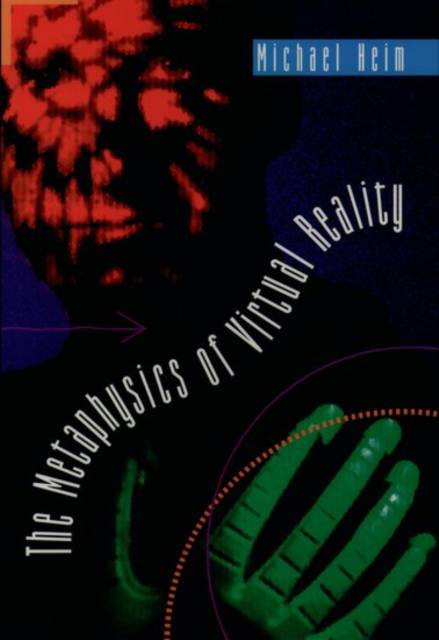
- Afhalen na 1 uur in een winkel met voorraad
- Gratis thuislevering in België vanaf € 30
- Ruim aanbod met 7 miljoen producten
- Afhalen na 1 uur in een winkel met voorraad
- Gratis thuislevering in België vanaf € 30
- Ruim aanbod met 7 miljoen producten
Zoeken
Omschrijving
Computers have dramatically altered life in the late twentieth century. Today we can draw on worldwide computer links, speeding up communications by radio, newspapers, and television. Ideas fly back and forth and circle the globe at the speed of electricity. And just around the corner lurks full-blown virtual reality, in which we will be able to immerse ourselves in a computer simulation not only of the actual physical world, but of any imagined world. As we begin to move in and out of a computer-generated world, Michael Heim asks, how will the way we perceive our world change?
In The Metaphysics of Virtual Reality, Heim considers this and other philosophical issues of the Information Age. With an eye for the dark as well as the bright side of computer technology, he explores the logical and historical origins of our computer-generated world and speculates about the future direction of our computerized lives. He discusses such topics as the effect of word-processing on the English language (while word-processors have led to increased productivity, they have also led to physical hazards such as repetitive motion syndrome, which causes inflamed hand and arm tendons). Heim looks into the new kind of literacy promised by Hypertext (technology which allows the user to link audio and video elements, the disadvantages including disorientation and cognitive overload). And he also probes the notion of virtual reality, "cyberspace"--the computer-simulated environments that have captured the popular imagination and may ultimately change the way we define reality itself. Just as the definition of interface itself has evolved from the actual adapter plug used to connect electronic circuits into human entry into a self-contained cyberspace, so too will the notion of reality change with the current technological drive. Like the introduction of the automobile, the advent of virtual reality will change the whole context in which our knowledge and awareness of life are rooted. And along the way, Heim covers such intriguing topics as how computers have altered our thought habits, how we will be able to distinguish virtual from real reality, and the appearance of virtual reality in popular culture (as in Star Trek's holodeck, William Gibson's Neuromancer, and Stephen King's Lawnmower Man).
Vividly and entertainingly written, The Metaphysics of Virtual Reality opens a window on a fascinating world that promises--or threatens--to become an integral part of everyday life in the 21st century. As Heim writes, not only do we face a breakthrough in the technology of computer interface, but we face the challenge of knowing ourselves and determining how the technology should develop and ultimately affect the society in which it grows.
In The Metaphysics of Virtual Reality, Heim considers this and other philosophical issues of the Information Age. With an eye for the dark as well as the bright side of computer technology, he explores the logical and historical origins of our computer-generated world and speculates about the future direction of our computerized lives. He discusses such topics as the effect of word-processing on the English language (while word-processors have led to increased productivity, they have also led to physical hazards such as repetitive motion syndrome, which causes inflamed hand and arm tendons). Heim looks into the new kind of literacy promised by Hypertext (technology which allows the user to link audio and video elements, the disadvantages including disorientation and cognitive overload). And he also probes the notion of virtual reality, "cyberspace"--the computer-simulated environments that have captured the popular imagination and may ultimately change the way we define reality itself. Just as the definition of interface itself has evolved from the actual adapter plug used to connect electronic circuits into human entry into a self-contained cyberspace, so too will the notion of reality change with the current technological drive. Like the introduction of the automobile, the advent of virtual reality will change the whole context in which our knowledge and awareness of life are rooted. And along the way, Heim covers such intriguing topics as how computers have altered our thought habits, how we will be able to distinguish virtual from real reality, and the appearance of virtual reality in popular culture (as in Star Trek's holodeck, William Gibson's Neuromancer, and Stephen King's Lawnmower Man).
Vividly and entertainingly written, The Metaphysics of Virtual Reality opens a window on a fascinating world that promises--or threatens--to become an integral part of everyday life in the 21st century. As Heim writes, not only do we face a breakthrough in the technology of computer interface, but we face the challenge of knowing ourselves and determining how the technology should develop and ultimately affect the society in which it grows.
Specificaties
Betrokkenen
- Auteur(s):
- Uitgeverij:
Inhoud
- Aantal bladzijden:
- 208
- Taal:
- Engels
Eigenschappen
- Productcode (EAN):
- 9780195092585
- Verschijningsdatum:
- 27/10/1994
- Uitvoering:
- Paperback
- Formaat:
- Trade paperback (VS)
- Afmetingen:
- 134 mm x 202 mm
- Gewicht:
- 181 g

Alleen bij Standaard Boekhandel
+ 44 punten op je klantenkaart van Standaard Boekhandel
Beoordelingen
We publiceren alleen reviews die voldoen aan de voorwaarden voor reviews. Bekijk onze voorwaarden voor reviews.











